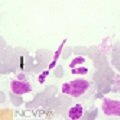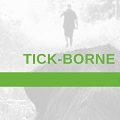Top Health Concerns
Current Topics in Infectious Disease |
|
|
Infectious diseases are potentially life threatening and can affect all dogs. Many of these diseases are also zoonotic, meaning they can affect humans, too. Being aware of key clinical signs and preventive measures are important to keep your dog healthy. Get the facts on other infectious diseases >>> |
|
Epilepsy |
|
|
Epilepsy is the most common medical neurological disorder in dogs. The term epilepsy refers to recurrent seizures resulting from an abnormality in brain function. The condition can be inherited (genetic epilepsy), caused by structural problems in the brain (symptomatic epilepsy), or may be of unknown cause (idiopathic epilepsy). Determination of the appropriate treatment for canine epilepsy, as well as prognosis for the condition, depends on accurate diagnosis of the type and cause of seizures. The goal of the initiative is to provide funds to support innovative research that will advance understanding of the mechanisms underlying epilepsy, leading to more effective treatments, as well as provide educational resources for dog owners and veterinarians. |
|
Tick-Borne Disease |
|
|
Tick-borne disease is a growing threat to canine and human health. Disease occurs when ticks infected with a pathogen bite a dog or human and transmit the pathogen into the body. Our research initiative aims to find better diagnostics, preventives, and treatments for tick-borne disease and furthers the AKC Canine Health Foundation's (CHF) mission to address One Health topics. |
|
Hemangiosarcoma |
|
|
Hemangiosarcoma is an aggressive and common cancer in dogs which can develop in any tissue or organ. While cutaneous masses are often treatable by tumor excision, tumors affecting internal organs are associated with poorer prognosis and are almost always incurable. CHF is committed to funding studies that work to find new prevention strategies, earlier diagnostics, and point of attack treatments for this devastating disease. |
|
Canine Cancer |
|
|
Cancer can be a devastating diagnosis for both humans and our beloved canine companions. There are over 77 million owned dogs in the United States and a fourth will develop cancer - including those in the bone, breast, pancreas, liver, prostate, lung, and skin. Veterinarians report that owners increasingly want to treat their pets rather than just managing their discomfort, but treatment options are limited and cost of radiation and chemotherapy can be prohibitive. CHF is committed to funding studies that will prevent, treat and hopefully one day cure canine cancers. |
|
Bloat |
|
|
Gastric dilatation, commonly known as bloat, is a rapidly progressing and devastating condition that can develop in several different breeds of dogs. Research funded through the Bloat Initiative aims to establish the causes and pre-dispositions for gastric dilatation-volvulus (GDV), or bloat. |
|
Canine Athlete |
|
|
Sports-related injuries in dogs are an important field of study, and CHF is committed to being on the forefront, providing grants for cutting-edge research into orthopedic concerns, proper nutrition and conditioning to achieve maximum performance while preventing injury, and innovative rehabilitation techniques. |
|
Xyltiol |
|
|
Information for dog owners on xylitol. |
Help Future Generations of Dogs
Participate in canine health research by providing samples or by enrolling in a clinical trial. Samples are needed from healthy dogs and dogs affected by specific diseases.
Help Future Generations of Dogs
Participate in canine health research by providing samples or by enrolling in a clinical trial. Samples are needed from healthy dogs and dogs affected by specific diseases.











